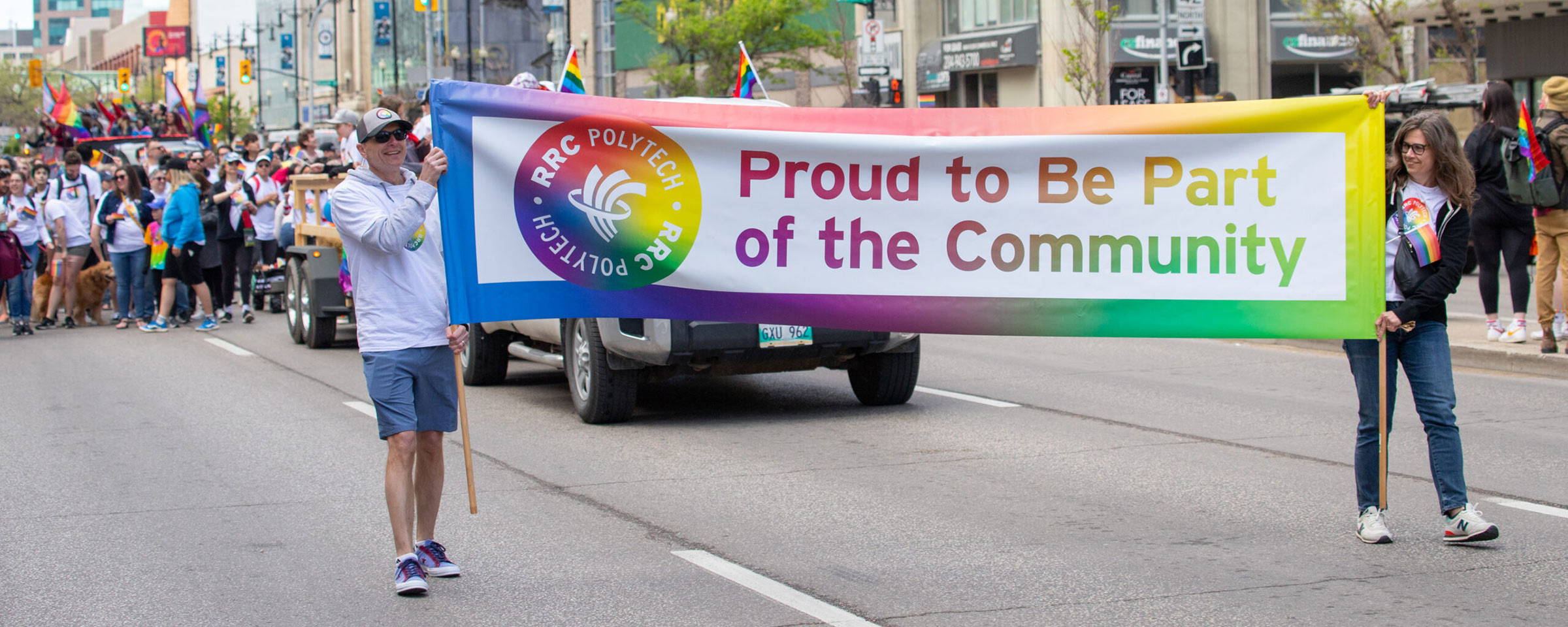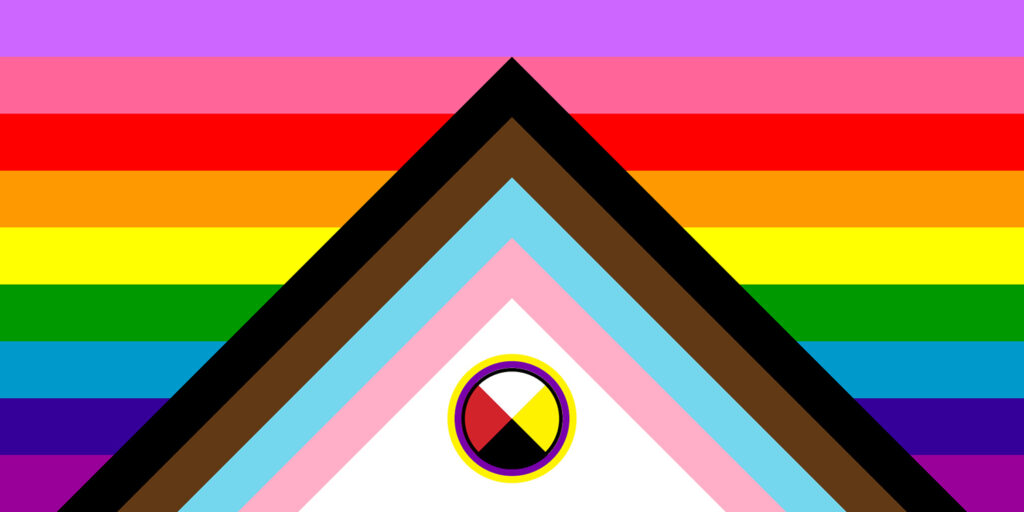The Rainbow Walkways Project and RRC Polytech’s Personalized Pride Design
RRC Polytech’s personalized Pride design is now permanently painted on the sidewalks in prominent locations at the Notre Dame Campus, Exchange District Campus and Portage La Prairie Campus, collectively known as the Rainbow Walkways Project.
The College’s Pride design is an evolution of the Progress Pride flag that includes representation for all 2SLGBTQIA+ (Two-Spirit, Lesbian, Gay, Bisexual, Transgender, Queer and/or Questioning, Intersex and Asexual) community members, and includes specific Indigenous elements.
“The Pride design reflects RRC Polytech’s on-going commitment to embedding equity, diversity and inclusion, and continuing our reconciliation journey as a College community,” says Melanie Gudmundson, Chief Human Resource Officer. “As an organization, we will continue to evolve our practices, policies and physical spaces to ensure that our staff, students and community feel accepted and welcome on our campuses.”
RRC Polytech’s Pride design includes the following elements:
- The triangle represents the badge LGBT prisoners were forced to wear in Nazi concentration camps.
- Moving the triangle to the bottom maintains this meaning, but also forms a tepee, which is a shelter shape historically used by many First Nations people in Manitoba and shows the upward momentum of the movement.
- The Medicine Wheel incorporates traditional Indigenous knowledge and teachings.
- The purple and yellow circles around the Medicine Wheel recognize intersex folx.
By combining these elements and colours and displaying them in prominent locations, the Rainbow Walkways project has been created to represent all human beings, and welcome everyone on Indigenous lands.
“The rainbow walkways, featuring the personalized Pride design, serves as a daily reminder of the work we have done and the work we still have to do after the paint dries,” says Vera Godavari, Equity, Diversity and Inclusion Specialist. “At RRC Polytech we are committed to walk the path of understanding, acceptance and allyship with the 2SLGBTQIA+ community, and are proud of making strides toward creating safer and braver spaces.”
This evolution of the Progress Pride flag aligns with the College’s recent announcement to adopt the 2SLGBTQIA+ acronym and lead with “2S,” respectfully acknowledging Two Spirit Peoples’ longevity, importance and status in Indigenous beliefs and traditions.
The term Two-Spirit has roots in Treaty 1 (Winnipeg), coming from the Anishinaabemowin (Ojibwe) words niizh manitoag (two-spirits). It often refers to a person who identifies as having both a masculine and a feminine spirit and is used by some Indigenous people to describe their sexual, gender and/or spiritual identity. The College’s design recognizes these origins and the trauma that has occurred throughout history.
“Honouring the teachings of our Two-Spirit ancestors and the Original Peoples of this land on the College’s Pride design demonstrates a willingness to create a culture of inclusivity moving forward and serves as a symbol that everyone is truly welcome,” says Carla Kematch, Director of Truth and Reconciliation. “Its unique design will prompt important conversations and continue to help us learn, grow, and heal.”
In addition to consulting with RRC Polytech’s Knowledge Keepers’ Council, Students Association, and its Gender and Sexual Identities working group, RRC Polytech also worked with the Rainbow Resource Centre on the evolution of the College’s Pride design.
“There is a rich history of pride within the 2SLGBTQ+ communities, and while it is important to honour that history and its impacts, Pride and its symbols will continue to evolve to better represent the communities we celebrate,” says Bre Calma, Training and Education Coordinator at Rainbow Resource Centre. “Pride is inclusive. Pride is diverse. Pride is progressive. Adapting the Pride flag to be more inclusive embodies these ideals. Rainbow Resource Centre supports RRC Polytech’s decision to incorporate new elements into the Pride flag to better represent their communities.”
The evolved design aligns with Commitment Two of the College’s Strategic Plan: Commit to Truth and Reconciliation. Pursue equity, diversity and inclusion in everything we do. June is traditionally an important time for living this commitment as it marks both Pride Month and Indigenous Peoples History Month, and a year-round emphasis will continue to strengthen that relationship.
The main entrance of the Notre Dame Campus features an approximately 14 by 7-metres (45 by 22.5-feet) painting. The dimensions of the Exchange District Campus are approximately 6 by 11-metres (18.75 by 37.5 feet). Portage Campus’s painting has been scaled to 7 by 3-metres (22.5 by 11.25 feet). These Rainbow Walkways are just the beginning, and the College will continue to pursue living its support for the 2SLGBTQIA+ community, wherever possible.
RRC Polytech has an evolving list of resources to support learning and allyship, available online.
The Knowledge Keepers’ Council was established to support the College’s 2022-26 Strategic Plan and its commitments, including the renewed commitment to responding to the Truth and Reconciliation Commission of Canada’s 94 Calls to Action. Allen Sutherland, Barbara Bruce, Albert McLeod and Martha Peet join Elder-in-Residence Paul Guimond to form the Knowledge Keepers’ Council, providing guidance and diverse Indigenous perspectives throughout RRC Polytech’s work to embed truth and reconciliation.

